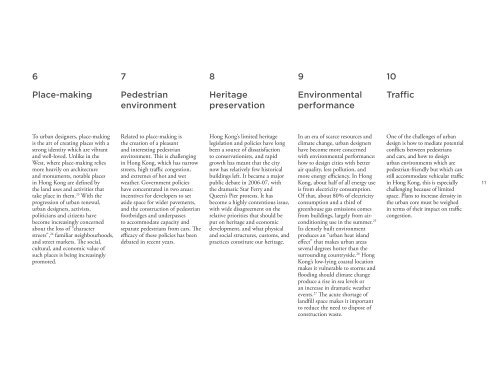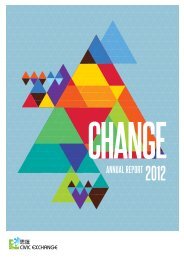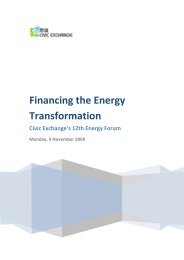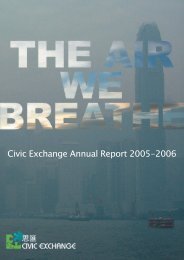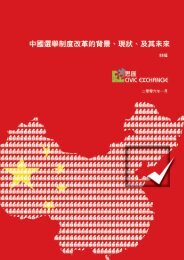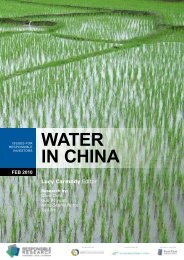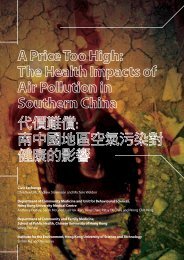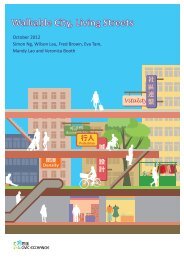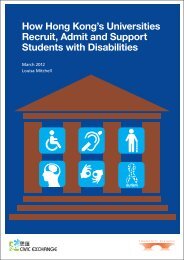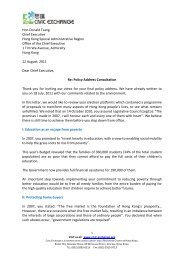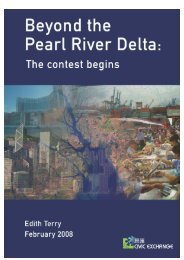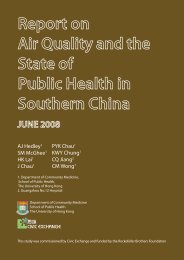Hong Kong Urban Design ConcernsHong Kong’s geography, regulatory environment, and development history have given it a one-<strong>of</strong>-a-kind cityscape that poses particular design challenges. These include:12345DensityScale andmassing <strong>of</strong> newdevelopmentView corridorsand sight linesThe waterfrontUrban greenspace10Hong Kong is an extremely densecity, with only 20% <strong>of</strong> its landmassbuilt up. 16 The most denselypopulateddistrict in 2008 wasKwun Tong, with 51,970 peopleper km 2 . 17 As a result, Hong Konghas a predominantly high-riseenvironment, a walkable citycentre, high patronage <strong>of</strong> publictransport, heavy use <strong>of</strong> formal andinformal public spaces, and a highdegree <strong>of</strong> public safety. However,many urban design problemsfacing Hong Kong occur becauseextremely high densities conflictwith people’s expectations for abetter quality <strong>of</strong> life.Hong Kong is one <strong>of</strong> <strong>the</strong> few citiesin <strong>the</strong> world where <strong>the</strong> “streetcanyon effect” is a serious problem.This occurs when buildings aremore than twice as tall as <strong>the</strong> width<strong>of</strong> roads, and <strong>the</strong>re are few or nogaps between buildings at groundlevel. This restricts <strong>the</strong> circulation<strong>of</strong> air and traps vehicle pollutantsat street level. 18 A variant <strong>of</strong> <strong>the</strong>“street canyon effect” is <strong>the</strong> “walleffect”, which occurs when clifflikebuildings or rows <strong>of</strong> closelyspacedtowers on <strong>the</strong> waterfrontblock air ventilation, sunlight,and sight lines, and exacerbate <strong>the</strong>urban heat island effect.Hong Kong’s combination <strong>of</strong> hillsand water give it some spectacularscenery, but views <strong>of</strong> hills, waterbodies, and man-made landmarkscan be easily obstructed by highrisebuildings. Current planningstandards and guidelines call for<strong>the</strong> incorporation <strong>of</strong> view corridorsinto urban layouts, and give someprotection to views from specificlocations on <strong>the</strong> waterfront. Theridgeline <strong>of</strong> hills on both sides<strong>of</strong> Victoria Harbour are seen asworthy <strong>of</strong> being kept free <strong>of</strong> visualobstruction.Victoria Harbour is a uniquenatural asset. Historically it was <strong>the</strong>city’s economic centre, and is nowappreciated for its aes<strong>the</strong>tic beauty,its iconic views, and its tourismvalue. However, waterfrontareas have not historically beenplanned for public enjoyment,but dedicated to industrial andinfrastructural uses such as roads,cargo handling, wholesale markets,incinerators, abattoirs, etc. Themore recent development <strong>of</strong> “wallbuildings” on <strong>the</strong> coast has alsocut people <strong>of</strong>f from <strong>the</strong> waterboth physically and visually. Thereis a growing demand for greatersensitivity in developing waterfrontareas.While about 40% <strong>of</strong> Hong Kong’sterritory is protected as countryparks giving citizens access to<strong>the</strong> wilderness, 19 green space is inextremely short supply within <strong>the</strong>urban core. The built-up areas <strong>of</strong>Hong Kong Island and Kowloonprovide only 0.05 hectare (ha)<strong>of</strong> parkland per 1,000 people,compared to about 0.7 ha per1,000 people in Manhattan andinner London, 20 and 0.67 ha per1,000 people in <strong>the</strong> built-up parts<strong>of</strong> Singapore. 21 In a 2006 surveyby Hong Kong University’s PublicOpinion Programme, 62% <strong>of</strong>respondents said that <strong>the</strong>y thoughtHong Kong lacked sufficient openspace and green parkland. 22
678910Place-makingPedestrianenvironmentHeritagepreservationEnvironmentalperformanceTrafficTo urban designers, place-makingis <strong>the</strong> art <strong>of</strong> creating places with astrong identity which are vibrantand well-loved. Unlike in <strong>the</strong>West, where place-making reliesmore heavily on architectureand monuments, notable placesin Hong Kong are defined by<strong>the</strong> land uses and activities thattake place in <strong>the</strong>m. 23 With <strong>the</strong>progression <strong>of</strong> urban renewal,urban designers, activists,politicians and citizens havebecome increasingly concernedabout <strong>the</strong> loss <strong>of</strong> “characterstreets”, 24 familiar neighbourhoods,and street markets. The social,cultural, and economic value <strong>of</strong>such places is being increasinglypromoted.Related to place-making is<strong>the</strong> creation <strong>of</strong> a pleasantand interesting pedestrianenvironment. This is challengingin Hong Kong, which has narrowstreets, high traffic congestion,and extremes <strong>of</strong> hot and wetwea<strong>the</strong>r. Government policieshave concentrated in two areas:incentives for developers to setaside space for wider pavements,and <strong>the</strong> construction <strong>of</strong> pedestrianfootbridges and underpassesto accommodate capacity andseparate pedestrians from cars. Theefficacy <strong>of</strong> <strong>the</strong>se policies has beendebated in recent years.Hong Kong’s limited heritagelegislation and policies have longbeen a source <strong>of</strong> dissatisfactionto conservationists, and rapidgrowth has meant that <strong>the</strong> citynow has relatively few historicalbuildings left. It became a majorpublic debate in 2006-07, with<strong>the</strong> dramatic Star Ferry andQueen’s Pier protests. It hasbecome a highly contentious issue,with wide disagreement on <strong>the</strong>relative priorities that should beput on heritage and economicdevelopment, and what physicaland social structures, customs, andpractices constitute our heritage.In an era <strong>of</strong> scarce resources andclimate change, urban designershave become more concernedwith environmental performance:how to design cities with betterair quality, less pollution, andmore energy efficiency. In HongKong, about half <strong>of</strong> all energy useis from electricity consumption.Of that, about 80% <strong>of</strong> electricityconsumption and a third <strong>of</strong>greenhouse gas emissions comesfrom buildings, largely from airconditioninguse in <strong>the</strong> summer. 25Its densely built environmentproduces an “urban heat islandeffect” that makes urban areasseveral degrees hotter than <strong>the</strong>surrounding countryside. 26 HongKong’s low-lying coastal locationmakes it vulnerable to storms andflooding should climate changeproduce a rise in sea levels oran increase in dramatic wea<strong>the</strong>revents. 27 The acute shortage <strong>of</strong>landfill space makes it importantto reduce <strong>the</strong> need to dispose <strong>of</strong>construction waste.One <strong>of</strong> <strong>the</strong> challenges <strong>of</strong> urbandesign is how to mediate potentialconflicts between pedestriansand cars, and how to designurban environments which arepedestrian-friendly but which canstill accommodate vehicular trafficin Hong Kong, this is especiallychallenging because <strong>of</strong> limitedspace. Plans to increase density in<strong>the</strong> urban core must be weighedin terms <strong>of</strong> <strong>the</strong>ir impact on trafficcongestion.11
- Page 7: The Local Context:Evolving Communit
- Page 12 and 13: 12In 1998, the Planning Department
- Page 14 and 15: Part I:14The URA —A Redevelopment
- Page 16 and 17: Version 2:The Urban RenewalAuthorit
- Page 18 and 19: URA Ordinance vs.Urban Renewal Stra
- Page 20 and 21: How The URA WorksThe Cycle ofResump
- Page 22 and 23: PART II:22The PoliticalEconomyof th
- Page 24 and 25: The Institutional ContextNationaliz
- Page 26 and 27: 26traditionally given the Lands Dep
- Page 28 and 29: 28maximum allowable plot ratio —
- Page 31 and 32: Left: Multi-ownership with inadequa
- Page 33 and 34: Weak building maintenanceregulation
- Page 35 and 36: Lack of FinancingOne significant pr
- Page 37 and 38: Left: Graham Streetrequirement. 137
- Page 39 and 40: Left: Graham Streetthe 1970s to ind
- Page 41 and 42: From the point of view of private d
- Page 43 and 44: The Built EnvironmentPart I discuss
- Page 45 and 46: Left: The K11 shopping mall, hotel,
- Page 48 and 49: Box 4Calculating Plot RatioPlot rat
- Page 50 and 51: 50Standardized ArchitectureStandard
- Page 53 and 54: Left: Langham Place, blank facade o
- Page 56 and 57: 56Figure-ground diagram of Langham
- Page 58 and 59: 58This page: Footbridge network ove
- Page 61:
Left: Wo Tik Street - the only acti
- Page 65 and 66:
Public Open Spaces and Pedestrian P
- Page 67 and 68:
The MertonThe Merton in Kennedy Tow
- Page 69 and 70:
Left: The widened pavement along Sh
- Page 71 and 72:
Langham PlaceThere are often paveme
- Page 73 and 74:
Recreational Public Open SpacesQuan
- Page 75:
Hanoi Road K11 Open SpaceSize: 1,20
- Page 78 and 79:
78Clockwise from left: The ground f
- Page 81 and 82:
The MertonTotal size (sites A and B
- Page 83 and 84:
General ObservationsLandscapingGene
- Page 85:
The URA also announced that it had
- Page 88 and 89:
Box 6The Counterproductive Pursuito
- Page 91 and 92:
Opposite, clockwise from top right:
- Page 93 and 94:
Social ImpactSocially sustainable d
- Page 96 and 97:
Left: Western Market has become pri
- Page 98 and 99:
98This spread from left: This anony
- Page 100 and 101:
Top: A naturally gentrified street
- Page 102 and 103:
102Comprehensive redevelopment disp
- Page 104 and 105:
104Luxury shopping at the K11 mall
- Page 106 and 107:
106A building rehabilitated by the
- Page 108 and 109:
According to town planner Ian Brown
- Page 110 and 111:
110
- Page 112 and 113:
112Wan Chai Market. Built in 1937,
- Page 114 and 115:
114
- Page 116 and 117:
116
- Page 118 and 119:
118Conclusion
- Page 120 and 121:
120
- Page 122 and 123:
Appendix 1Name of projectAddress/lo
- Page 124 and 125:
Name of projectAddress/locationArea
- Page 126 and 127:
126Endnotes1 HKSAR Planning Departm
- Page 128 and 129:
128110 Chan, B. W. (2002), “The h
- Page 130:
Room 701, Hoseinee House,69 Wyndham


